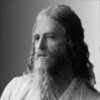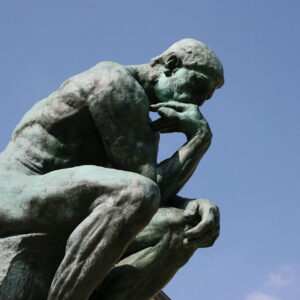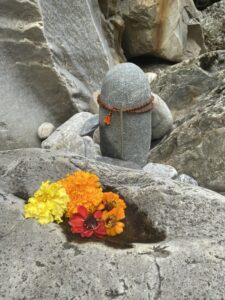Joe was walking along the street when he saw his friend, Nasruddin, on his hands and knees. Joe asked, “Hey, Nasruddin, what are you doing?”
Nasruddin replied, “I’m looking for my lost iPod.”
“Let me help you,” said Joe, and he also got down on his hands and knees to search.
After some time with no success, Joe asked his friend, “Nasruddin, are you sure you lost your iPod out here?”
“Oh, no,” said Nasruddin, “I lost it at home.”
Joe was shocked. “If you lost it at home, then why are we looking out here?”
Nasruddin explained, “Well, the light is better out here.”
People are not inherently bad. They are not so deeply flawed they cannot be corrected. There is no wound that cannot be healed, no act that cannot be forgiven. We are not under the influence of an original sin for which we must pay a price. We are however, suffering, and until we admit this truth we will continue to suffer. A person cannot heal a wound they refuse to admit is present.
Suffering takes three forms: fear, loneliness, and confusion. Like three strands of a strong rope, we are bound until we undertake the process of becoming free. This process is called sadhana, spiritual practice. Sadhana corrects the problem of suffering at its root. All of the remedies within the world of objects and relationships will ultimately fail because, like our friend, Nasruddin, we are looking in the wrong place.
The yoga tradition describes the ladder into suffering as having five rungs — avidya, ignorance; asmita, ego; raga, obsession; dvesha, repulsion; and abhinivesha, clinging. We will examine these five steps and discover the genius of the yogic sages. Perhaps their dissection of the nature of our pain will help us climb back up the steps we descended.
Avidya is a compound word. Vidya means “wisdom,” and “a” is a negative prefix. Hence, the term means “a lack of wisdom.” In more colloquial terms, it can be thought of as a lack of mental health. This is very good news. Since the problem is within, we are not dependent on others or on external circumstances for correction. Because our problem is in our own mind, we are inherently empowered to heal ourselves by changing our mind. It is really quite simple, though no one with experience in this process of correction will describe it as easy.
It is often hard for people to accept they are not very wise. We have confused our ability to think and see with the ability to contemplate and envision. Wisdom is vastly different from being able to think in complicated terms and imagine new and different ways of manipulating matter. We are certainly smart, we are very clever; we have a seemingly infinite ability to generate new and exciting devices to entertain and inform. Hardly anyone these days isn’t walking around with some gadget they can use to stimulate and amuse themselves. It may soon become apparent, however, that just like every other technological or social development, suffering is not diminishing.
To be wise is to know your true identity. To be in avidya is to not know who you are. As a matter of fact, avidya runs so deep that most people are not even aware they do not know who they are. Like a theater actor who forgets he is just playing a role and stays in character after the final curtain, the individual in avidya has confused his Self with his worldly persona. His friends, the yogic sages, will try and gently point out his folly, but the adamant actor will likely argue against the counsel.
The yogis tell us our true identity is satyam-shivam-sundaram, a manifestation of eternal love and beauty. But we argue, based on the evidence of the worldly theater, that this is not the case. In overt and covert ways, we repeatedly reinforce avidya in ourselves and each other. Sages come into this world to tell us the truth; a truth that is not subject to popular opinion or a vote.
Once we have fallen under the spell of avidya, forgetting our divine identity, we then construct a false identity. This false sense of self, asmita, the ego, is based on biological and social roles. Ego is the sense of isolated individuality, of being a tiny person in a vast, uncaring universe. The experience of identifying with a false self is suffering, in all ways and in every way. Because this false self is untrue, it takes defending to keep it in place. Lies are stressful because they require excessive energy to prop them up.
Because the ego is based on limitations, its needs seem to be met by external objects and relationships. The pursuit of external rewards and pleasures is called raga, the avoidance of external objects and relationships is called dvesha. The result of living at this level of consciousness is that the world seems like a minefield. One must always walk gingerly to avoid the unpleasant and dangerous, hoping to find a few scraps of happiness along the way.
The strategy for happiness employed by the ego cannot work. Even if we secure something we want, it takes diligence and effort to try and keep it in place. Plus, because our pleasures and security are based on objects or relationships that are time-bound, they will inevitably come to an end. The futile, exhausting effort to hold onto pleasure and security in a world of constant change and flux is called abhinivesha.
This whole cycle of ignorance, ego, obsession, and repulsion, and seeking security where it can’t be found is, from the yogic perspective, one big “stupid-fest.” Although most people find it insulting to be called stupid, well, maybe our overly-delicate sensitivity to this accurate diagnosis is the greatest evidence of our stupidity. Recognizing and admitting our stupidity is not a slight, it is the key to freedom. Integrity is not found by identifying with illusions, it comes by challenging ourselves to grow out of them. Yogis use strong language deliberately. Those in deep sleep need a loud alarm clock.
When we admit we are stuck in dysfunctional patterns caused by ignorance and its effects, then we have the opportunity to heal. As we overcome these obstacles and claim our divine nature, the world doesn’t change but our attitude towards it does. Biology and society continue as they did before our awakening, but they are no longer a source of discontent. By seeing ourselves in a true light we become capable of seeing others in their true light. Can you imagine seeing everything and everyone as an expression of eternal love and beauty? This is the truth. All other forms of perception are illusory, based on ignorance.
Examine your own life and admit you do not feel like a divine being. Undertake your sadhana, do your spiritual practice; confront the false beliefs within yourself. Call out these lies, and the truth will naturally arise. Claim your own stupidity, laugh at the folly of self-perpetuated fear, loneliness and confusion. Stop looking under the street-lamps of dysfunction and listen to the yogis. Everything and everyone who tells you that you are not a manifestation of divine love and beauty is lying. To be stupid is not a sin, but it is definitely not much fun. Set your healing energy free. Arise and awake, divine soul.




